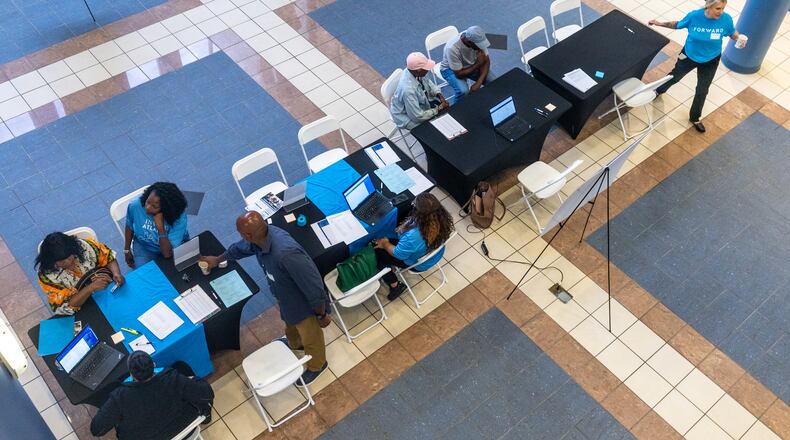Against the backdrop of Atlanta’s rapid growth, people who call the city home risk being priced out of their neighborhoods, with older, low-income people particularly vulnerable.
To help this at-risk population, Atlanta’s economic development arm Invest Atlanta rolled out a pilot program this summer offering property tax relief.
Invest Atlanta staff held a session Tuesday at Atlanta Technical College to raise awareness for its Anti-Displacement Tax Relief Fund Program, and to qualify people and file applications, including for those lacking the technology to do it themselves.
The $10 million program is aimed at people aged 60 years and older, and Invest Atlanta is randomly selecting 200 people to take part in the pilot. It will pay tax increases above the base rate for participants for 20 years.
Brenda Harris has lived in a single-family home in the neighborhood of Cascade Heights in southwest Atlanta for about 10 years. Her property taxes have gone up to the point where she is struggling to pay them with her Social Security income of about $1,500 a month. The 70-year-old said she recently had to refinance her home to cover $40,000 of repairs after she discovered structural problems had compromised the walls in her bathroom and kitchen.
“We don’t work to get our houses and then to be taxed out of them. That’s not fair,” Harris said at the college. “I love that community. I was raised in that area. That’s why I want to stay and I don’t necessarily want to go into a high-rise. I have kids, and that’s our family home.”
Credit: Steve Schaefer /
Credit: Steve Schaefer /
Harris was among dozens of people who attended the sessions on Tuesday and over the weekend. Anita Allgood, vice president of Single Family & Homeownership Services at Invest Atlanta, said homeowners must have lived in their home since at least 2015 to qualify for the program.
People who have a household income of 60% of the area median income or less are eligible to apply. For a one-person household that equates to an income limit of $45,180 a year, or $51,600 for a two-person household, according to U.S. Department of Housing and Urban Development data for the Atlanta-Sandy Springs-Roswell area. The home must have clear title, be free of liens and applicants should be actively enrolled in a qualifying homestead exemption program.
The 11-county Atlanta area added close to 63,000 residents between April 2023 and April 2024, and the wider metro region is projected to have almost 8 million residents by 2050. In 2021, an Atlanta Journal-Constitution analysis found that the city’s Black majority had disappeared, as more whites moved to the city.
Allgood said she wants the program to help protect people who “built these neighborhoods” and “give them the opportunity to stay.”
Carmelita Beckham-Gaston is another Atlanta resident who is hoping the program will offer some relief. The 60-year-old works as a surgery scheduler at Grady Memorial Hospital. She lives in the Dixie Hill neighborhood in West Atlanta, in a Habitat for Humanity home.
“The property taxes have been really high. They’re doing gentrification in my area, and there’s a $615,000 house right down the street from me. I know my taxes will probably end up going up,” she said.
Allgood said Invest Atlanta found southwest Atlanta and Grove Park were neighborhoods where growth and rising taxes were having the largest impact on older adults.
Invest Atlanta worked with consulting firm APD Urban Planning and Management to identify neighborhoods that have the highest concentration of households that are most at risk from gentrification. The agency is limiting the footprint of the program to 65 neighborhoods, but wants to add more.
Allgood said some people had realized they don’t qualify after attending their event and she said she understood their disappointment. But she said they shouldn’t give up hope. “We are going to increase capacity and expand those neighborhoods until we eventually have the entire city covered,” she said.
Invest Atlanta will accept applications for the program annually. For residents who still want to apply online, applications are open through Aug. 17.
About the Author
Keep Reading
The Latest
Featured





